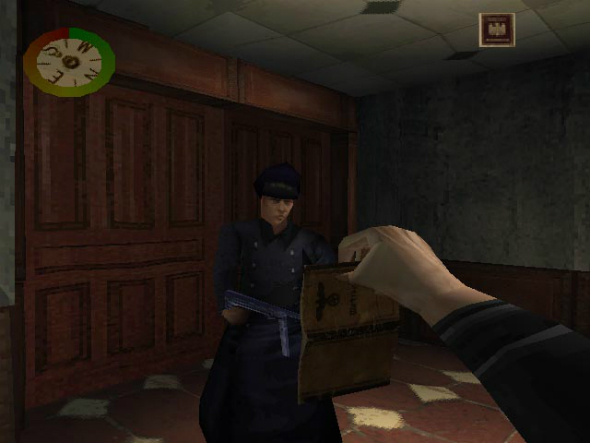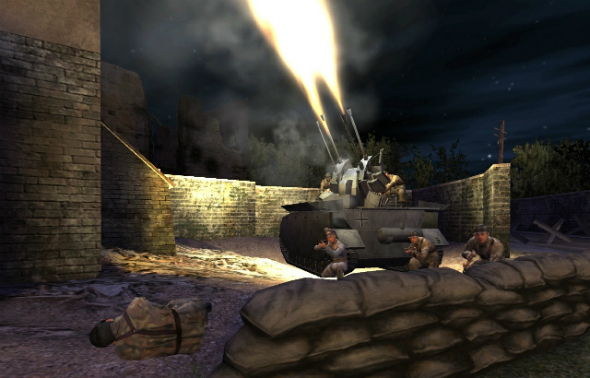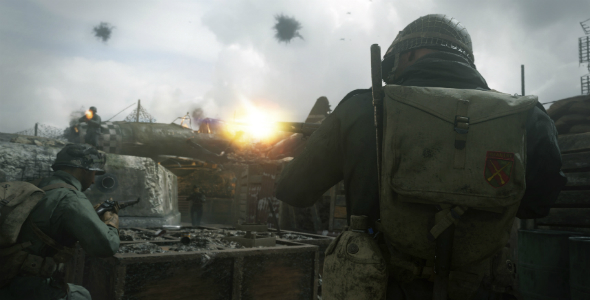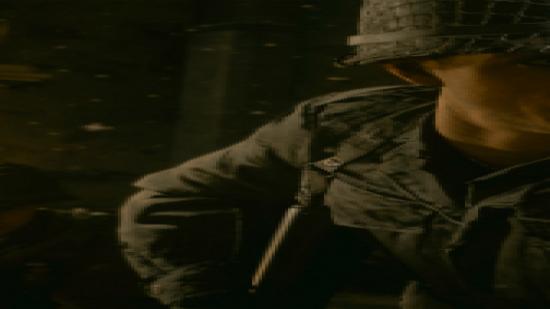The original Medal of Honor, released all the way back in 1999, didn’t need explosions or spectacle to be exciting. Missions had you play as an American spy during World War II and often took place away from large-scale battles, deep behind enemy lines. Instead of being strapped into a helmet and bandoleer, you’d be disguised in a Nazi officer’s uniform. Rather than shooting them with a Thompson, you’d sneak past enemies using only your wits and a fake ID; occasionally, a suspicious soldier might stop you in your tracks, peer right into your face, and bark “let me see your papers!” If he saw through your masquerade, or you panicked and whipped out your pistol, the alarm would sound and the mission would be a bust.
After more? Check out our list of the best FPS games on PC
That moment, when you were forced to hold up your phoney documents, was agonising. It was when all of Medal of Honor’s tension came to bear. For a few seconds, you were made to feel utterly powerless. Moreover, it impressed something particularly sinister about the Nazis themselves. They weren’t just foot-soldiers with rifles and bombs. They were bureaucrats. They were systematic. They wanted to make sure everybody was just like them.

In one small instance, without any shooting or spectacle, Medal of Honor encapsulated fear, uncertainty, and a terrific sense of what was at stake if the Allies lost – the entire big picture of the Second World War. But four years later, a much louder, brassier game would arrive to replace it. Call of Duty quickly became the most popular World War 2 game and it had very different ideas about what constitutes excitement.
Call of Duty’s opening level is a deliberate, almost cocky statement of intent. Dropped into France on the night before D-Day, you spend the first couple of minutes sneaking around by yourself, picking off patrols using a tinny little pistol. It’s night-time, you’re fighting almost silently, and you’re way inside enemy territory – basically, it feels very Medal of Honor. But then you reach a field, plant a radio beacon, and look up. The sky is filled with parachuting American soldiers. They briskly land, shout some orders at one another, and then an enormous fire fight bursts into life. Suddenly, you’re no longer just one guy, shooting two, maybe three enemies at a time. You’re part of an army, and you’re fighting against an entire German platoon.
In 2003, it was spectacular. Call of Duty was bigger, brasher, and more bloody than Medal of Honor. Instead of small, isolated beats, it communicated history using sound and scale. The sense it gave of WWII wasn’t articulate so much as sensory and raw. If Medal of Honor, in its stealthy levels, teased at some inner dread, Call of Duty slapped and shouted right into your face: it was the war at full volume.

Narratively speaking, it also had something that Medal of Honor did not. In a war story, it’s fair to expect some big emotional moment. A tragic death, perhaps, some noble sacrifice, or a great, glorious victory. Missions in Medal of Honor, usually taking place inside grey German factories, might be intense but they were never melodramatic. Call of Duty, by contrast, was unabashedly sentimental. In one mission, your commanding officer took a bullet and died for you. In another, you valiantly held off waves of tanks to the melancholic swell of opera music. To this day, Call of Duty does shameless theatrics better than any other shooter. And if a WWII action game needs one thing, it’s that defiant, emotional core.
The forthcoming Call of Duty: WWII sees the series return to its roots, ten years since it moved into more contemporary territory. I think the game could learn much from Medal of Honor, the series that Call of Duty put out to pasture. Since exploding a nuclear bomb in the middle of Modern Warfare, Call of Duty has been struggling to one-up its own action scenes and dramatic stakes. Between outlandish new gadgets, celebrity-voiced villains, and finally going into space, Call of Duty has made various, flagrant attempts to keep our attention, and in the process has felt increasingly dull.
At the same time, thanks to games such as BioShock, Red Dead Redemption, and Gone Home, we, as players, have developed a taste for more substantive stories. We want more relatable characters and situations. We want a plot that respects our intelligence and isn’t afraid to make us think a little. We want tension and thrills that stem from things other than explosions.

In short, Medal of Honor’s quiet brand of drama – its ability to make you sweat, and reflect on the significance of what you were doing through small interactions – is back in vogue. Medal of Honor respected both its players and subject matter. By comparison, when Call of Duty still expects us to go giddy with excitement every time something blows up, it risks coming across as patronising. A higher opinion of its audience and more adherence to reality are likely the shots in the arm Call of Duty needs.
Call of Duty: WWII has the potential to provide them. With the entire history of the war at its disposal, and no sci-fi gadgets, WWII, hopefully, will be compelled to tell a more grounded story, one that plays on our minds as much as our senses. Where in 2003 big explosions and epic-scale battles felt new, and low-key depictions of the war were getting stale, in 2017 the trends are reversed. Spectacle is rote, and it’s the smaller, quieter stories that are on the cutting edge.
For that reason, if WWII goes back to basics – if it relies on characters, intimate tension, and actual history to create excitement – it will epitomise the best of the Second World War shooters. It won’t just be capturing the spirit of Medal of Honor, it’ll be returning to the audacity and willingness to try different things that made Call of Duty a great series in the first place.
